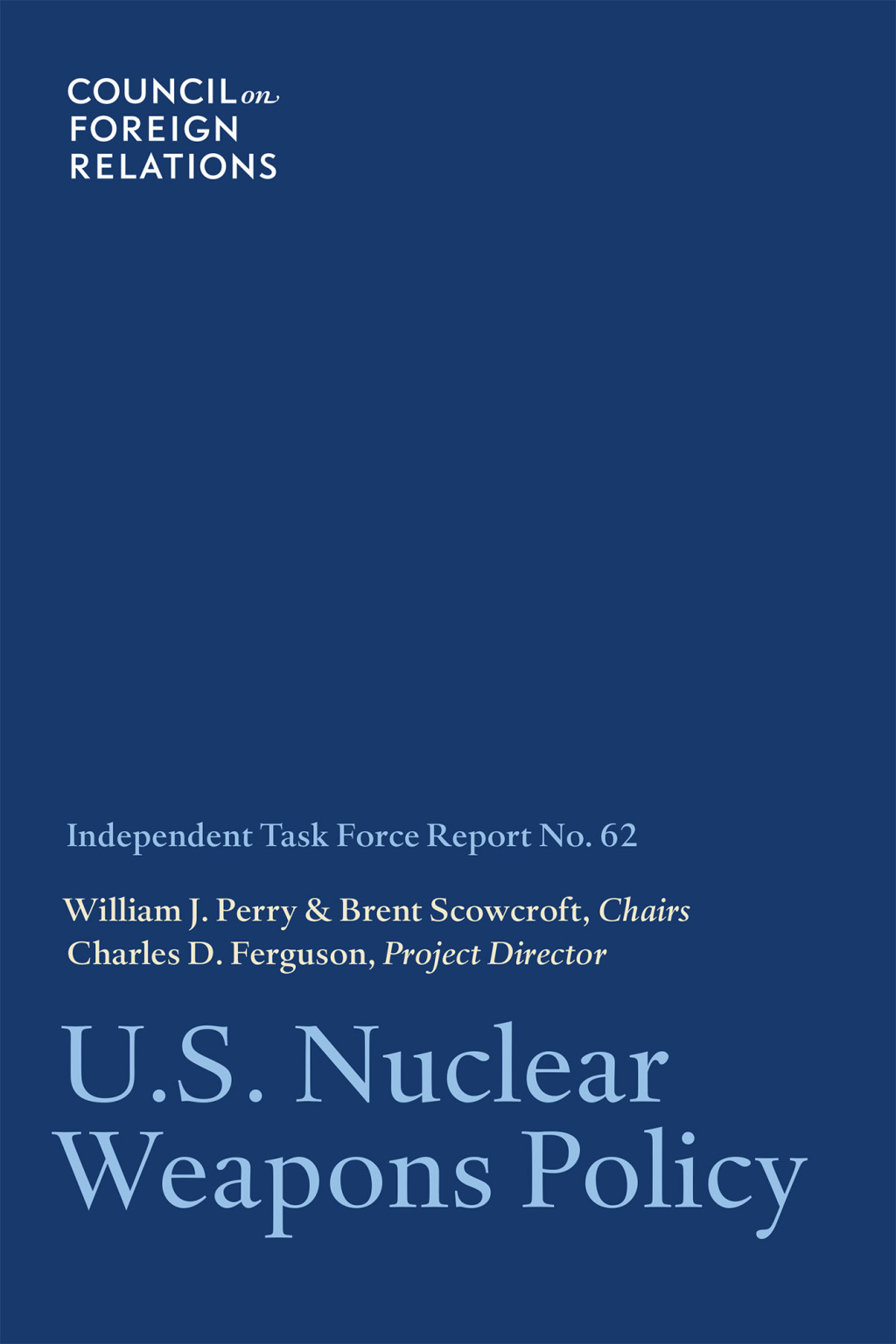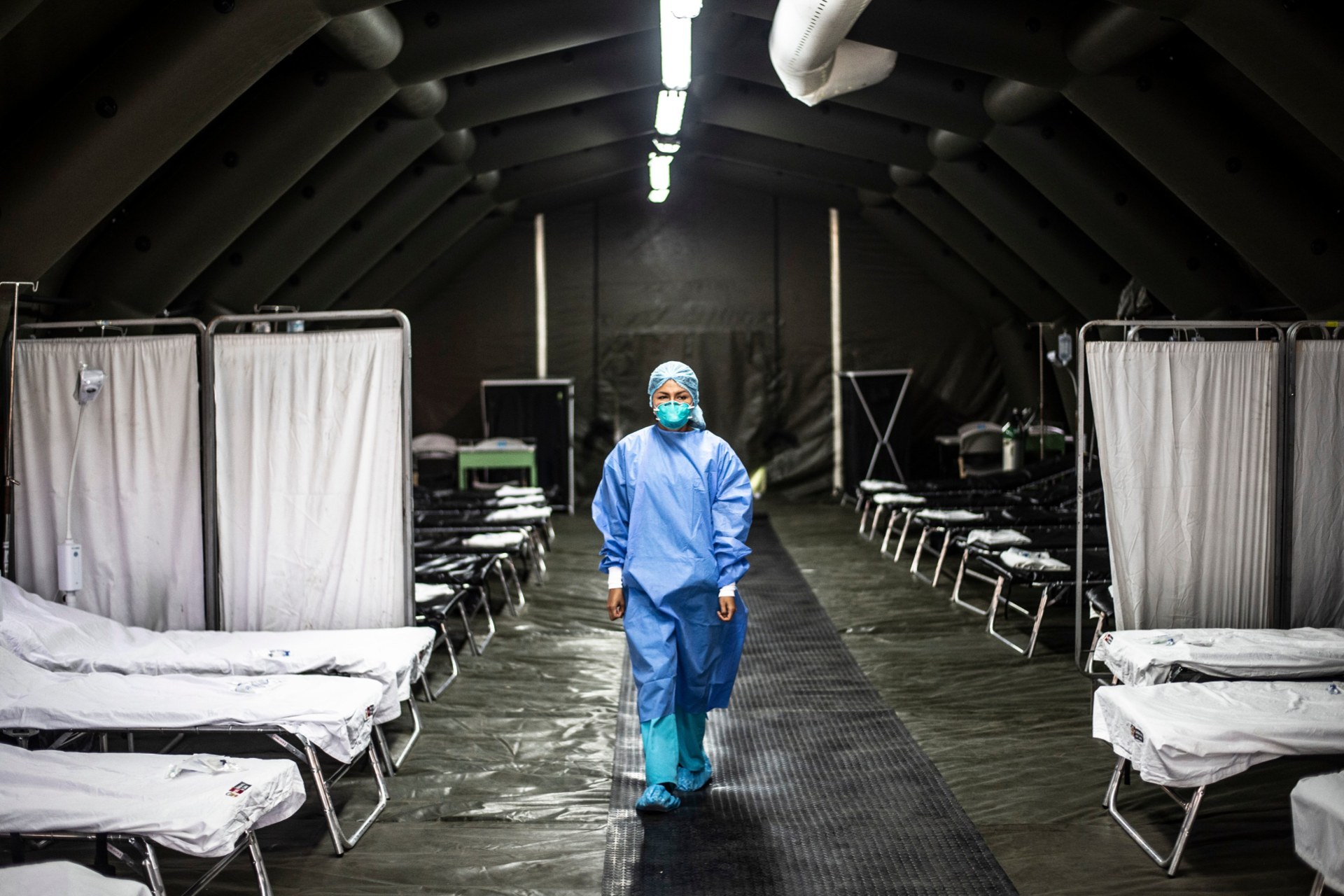Task Force Report No. #67
U.S. Nuclear Weapons Policy
- Brent ScowcroftCochair
- William J. PerryCochair
- Charles D. FergusonDirector
What are Task Force Reports?
CFR sponsors Task Forces to assess issues of critical importance to U.S. foreign policy to reach bipartisan consensus on policy recommendations.
Who makes them?
Task Force members aim to reach a meaningful consensus on policy and are solely responsible for the content of their report.
In his April 5 Prague speech, President Obama called for the United States to lead international efforts toward a world free of nuclear weapons. A new Council on Foreign Relations-sponsored Independent Task Force report, co-chaired by former secretary of defense William J. Perry and former national security adviser Brent Scowcroft, says that while “the geopolitical conditions that would permit the global elimination of nuclear weapons do not currently exist,” steps can be taken now to diminish the danger of nuclear proliferation and nuclear use.
The Task Force report, titled U.S. Nuclear Weapons Policy, focuses on near-term policies to reduce nuclear weapons to the lowest possible level consistent with maintaining a credible deterrent, while also ensuring that the U.S. nuclear arsenal is safe, secure, and reliable for as long as it is needed. “The imperative before the Obama administration,” the report says, “is to use all available tools to prevent the use and further acquisition of nuclear weapons.” The Task Force is comprised of eminent leaders of the national security community and is directed by CFR Senior Fellow Charles D. Ferguson.
The report notes that “Iran’s nuclear program poses the most significant challenge to strengthening the rules-based nonproliferation regime and preventing a nuclear arms race in the Middle East.” The Task Force underscores that bolstering the global nonproliferation regime is the best way to contain the threat of proliferation posed not only by Iran, but also by North Korea and other potential nuclear states.
Recommendations: The report recommends that U.S. policymakers take the following steps to lessen nuclear threats and promote cooperation on disarmament:
− state clearly that it is a U.S. goal to prevent nuclear weapons from ever being used, by either a state or a nonstate actor, and that the sole purpose of U.S. nuclear weapons is providing deterrence for itself and its allies;
− reaffirm security assurances to allies;
− continue to reduce reliance on nuclear weapons and do so in a transparent manner, and take the international lead in reducing the salience of nuclear weapons in security policy;
− seek further reductions in nuclear forces, beginning with a bilateral strategic arms control agreement with Russia;
− seek to ratify the Comprehensive Test Ban Treaty (CTBT), taking as many steps as possible toward this end before the Nonproliferation Treaty Review (NPT) Conference in May 2010;
− call for a moratorium on the production of fissile material for weapons purposes;
− strengthen the International Atomic Energy Agency’s vital role of containing proliferation, including seeking universal adoption of the Additional Protocol and providing adequate and sustainable funding to the Agency;
− work cooperatively to ensure that every state with nuclear weapons or weapons-usable materials -- even those that remain outside the Nonproliferation Treaty like India and Pakistan -- implements best nuclear security practices.
The Task Force notes that “the United States cannot form a more effective nuclear security system alone. It must work cooperatively with global partners. All states share the responsibility to ensure that nuclear weapons are never used again, to prevent the acquisition of additional nuclear weapons by other states, and to redouble efforts to secure and reduce existing nuclear weapons and weapons-usable materials.”
Russia: “The Task Force emphasizes that the United States has a particular opportunity in the renewal of arms control talks with Russia and urges a revitalized strategic dialogue with Russian leaders.” The Task Force notes that the impending expiration of the Strategic Arms Reduction Treaty (START) provides an opportunity to make deeper cuts in American and Russian nuclear arsenals and it applauds steps in this direction.
China: While China is a “nuclear-armed rival,” the Task Force notes that the United States and China “are not yet ready to form a formal nuclear arms control agreement because of the significant asymmetry between their two arsenals.” Rather, the report calls for renewed military-to-military discussions with China to encourage transparency and a serious dialogue about weapons in space, including seeking a trilateral ban by China, Russia, and the United States on testing anti-satellite weapons.
The Task Force emphasizes that post-Cold War changes in the security environment call for renewed American leadership to shape U.S. nuclear weapons policy. “Many competing interests demand President Obama’s attention, but the impending expiration of the Strategic Arms Reduction Treaty (START) in December 2009, the upcoming congressionally mandated nuclear posture review, and the preparation for the 2010 Nonproliferation Treaty Review Conference offer the new administration an opportunity to begin to review existing treaties, revive negotiations, strengthen the global nonproliferation system, and promote best nuclear security efforts.”
The Independent Task Force on U.S. Nuclear Weapons Policy was made possible in part by generous grants from the Carnegie Corporation of New York and the Ploughshares Fund. CFR also thanks the Robina Foundation for its support of CFR’s work on nuclear energy and nuclear nonproliferation through the International Institutions and Global Governance program. The statements made and views expressed in this report are solely the responsibility of the Task Force members.
Educators: Access theTeaching ModuleforU.S. Nuclear Weapons Policy.
Task Force Members
Spencer P. Boyer is the director of international law and diplomacy in the National Security and International Policy Department of the Center for American Progress. He was previously the executive director and War Powers Initiative director at the Constitution Project, based at Georgetown University’s Public Policy Institute. Boyer began his professional career as an associate in the international law firm of Jones, Day, Reavis & Pogue, and has served with international courts and tribunals in The Hague, Zurich, and Paris. Boyer is a coeditor and contributor to Power and Superpower: Global Leadership and Exceptionalism in the 21st Century. He is a graduate of Wesleyan University and received his MA and JD degrees from New York University.
Linton F. Brooks served from July 2002 to January 2007 as administrator of the U.S. Department of Energy’s National Nuclear Security Administration, where he was responsible for the U.S. nuclear weapons program and for the department’s international nuclear nonproliferation programs. His extensive government experience includes service as the assistant director of the U.S. Arms Control and Disarmament Agency, chief U.S. negotiator for the Strategic Arms Reduction Treaty (where he held the rank of ambassador), director of arms control for the National Security Council, and a number of Navy and U.S. Department of Defense assignments. He is now an independent consultant on national security issues, a senior adviser at the Center for Strategic and International Studies, and a distinguished research fellow at the National Defense University.
Ashton B. Carter* was recently confirmed as undersecretary of defense for acquisition, technology, and logistics. He is on leave from Harvard University’s John F. Kennedy School of Government, where he was the Ford Foundation professor of science and international affairs and codirector of the Preventive Defense Project. From 1993 to 1996, Carter served as assistant secretary of defense for international security policy. He was twice awarded the Department of Defense’s Distinguished Service Medal, the highest award given by the Pentagon. For his contributions to intelligence, he was awarded the Defense Intelligence Medal. Before his government service, Carter was the director of the Center for Science and International Affairs at the Kennedy School. He received bachelor’s degrees in physics and medieval history from Yale University and a doctorate in theoretical physics from Oxford University, where he was a Rhodes scholar.
John Deutch is institute professor at the Massachusetts Institute of Technology, where he previously was provost, dean of science, and chairman of the Department of Chemistry. His government career has included serving as director of central intelligence, deputy secretary of defense, and undersecretary of defense (acquisition and technology) in the first Clinton administration, and undersecretary and director of energy research in the U.S. Department of Energy in the Carter administration. He served on the President’s Intelligence Advisory Board for President George H.W. Bush and on the President’s Science and Technology Advisory Committee for President Reagan and President Clinton. Deutch is on the boards of Cheniere Energy, Citigroup, and Raytheon. He is a trustee of Resources for the Future, the Center for American Progress, the Urban Institute (life), and the Museum of Fine Arts, Boston.
Charles D. Ferguson is the Philip D. Reed senior fellow for science and technology at the Council on Foreign Relations. He is also an adjunct professor in the security studies program at Georgetown University and an adjunct lecturer in the national security studies program at the Johns Hopkins University. Before arriving at CFR in 2004, he worked as a scientist-in-residence in the Washington, DC, office of the Monterey Institute’s Center for Nonproliferation Studies. Ferguson has served as a foreign affairs officer in the Bureau of Nonproliferation, U.S. Department of State, where he helped develop policies on nuclear safety and security issues. He has also worked on nuclear proliferation and arms control issues as a senior research analyst and director of the nuclear policy project at the Federation of American Scientists. After graduating with distinction from the U.S. Naval Academy, he served as an officer on a ballistic missile submarine during the Cold War. He holds a PhD in physics from Boston University.
Michèle A. Flournoy+ was recently confirmed as undersecretary of defense for policy. Before accepting this post, she was president of the Center for a New American Security (CNAS). Before cofounding CNAS, she was a senior adviser at the Center for Strategic and International Studies and a distinguished research professor at the Institute for National Strategic Studies at the National Defense University. Before that, she was dual-hatted as principal deputy assistant secretary of defense for strategy and threat reduction and deputy assistant secretary of defense for strategy. Flournoy was awarded the Secretary of Defense Medal for Outstanding Public Service in 1996, the Department of Defense Medal for Distinguished Public Service in 1998, and the Chairman of the Joint Chiefs of Staff’s Joint Distinguished Civilian Service Award in 2000.
John A. Gordon served in the White House as the president’s homeland security adviser from June 2003 until June 2004 and as the deputy national security adviser for counterterrorism and the national director for counterterrorism from June 2002 to June 2003. Before joining the White House team, Gordon was the first administrator of the National Nuclear Security Administration and undersecretary of energy, responsible for the entirety of the nation’s nuclear weapons program, serving from June 2000 until June 2002. As an Air Force four-star general, he was the deputy director of central intelligence from October 1997 until June 2000. Gordon’s thirty-two-year Air Force career included significant concentration on research and development, strategic planning, missile and space operations, intergovernmental operations, and international negotiations.
Lisa E. Gordon-Hagerty is president and chief executive officer of LEG Inc., a consulting firm providing strategic advice and counsel in global energy issues. Gordon-Hagerty served as executive vice president and chief operating officer of USEC Inc., the world’s leading supplier of enriched uranium fuel for commercial nuclear power plants. She is a former member of the White House National Security Council staff, where she served as director for combating terrorism, overseeing from 1998 to 2003 the federal government’s readiness and response to acts of chemical, biological, and nuclear terrorism. Before joining the White House NSC staff, she served for six years at the Department of Energy, where she held positions overseeing several programs including emergency management, operational emergency response and the safety and security of the country’s nuclear weapons program. Before that, she was a professional staff member of the Energy and Commerce Committee of the U.S. House of Representatives. Gordon-Hagerty began her professional career as a physicist at the Lawrence Livermore National Laboratory.
Eugene E. Habiger is a distinguished fellow and policy adviser with the University of Georgia’s Center for International Trade and Security. In his previous assignment as the commander in chief of the U. S. Strategic Command (STRATCOM), he was responsible for all U.S. Air Force and U.S. Navy strategic nuclear forces supporting the national security strategy of strategic deterrence. Before joining the Center for International Trade and Security, General Habiger was the president and CEO of the San Antonio Water System, where he was responsible for general operations along with the strategic long-range business and water resources planning for the ninth-largest city in the United States. He also worked as the Department of Energy’s director of security and emergency operations. As the department’s Security Czar, he was charged by the secretary with changing the security culture at the Energy Department and establishing a program to reenergize and restore confidence in the department’s Security Program.
J. Bryan Hehir is the Parker Gilbert Montgomery professor of the practice of religion and public life at the Harvard Kennedy School of Government. He also serves as the secretary for health and social services in the Archdiocese of Boston. From 1973 to 1992, he served on the staff of the U.S. Conference of Catholic Bishops in Washington addressing issues of foreign policy and domestic policy. He served on the Georgetown School of Foreign Service faculty (1984-92; 2002-2003) and the Harvard Divinity School (1993-2001). From 2002 to 2004, he was president of Catholic Charities USA. His teaching and writing focus on ethics and international relations and the role of religion in politics. He is a MacArthur fellow. His writings include “The Moral Measurement of War,” “Military Intervention and National Sovereignty,” and “Catholicism and Democracy.”
Laura S. H. Holgate has served since 2001 as the vice president for Russia/New Independent States Programs at the Nuclear Threat Initiative (NTI). Before joining NTI, Holgate directed the Department of Energy’s Office of Fissile Materials Disposition where she was responsible, from 1998 to 2001, for consolidating and disposing of excess weapons plutonium and highly enriched uranium in the United States and Russia. From 1995 through 1998, she directed the Cooperative Threat Reduction (Nunn-Lugar) program of U.S. assistance to Russia and other former Soviet states to eliminate the WMD legacy of the Cold War. She holds an AB from Princeton University and an SM from the Massachusetts Institute of Technology, and spent two years on the research staff at Harvard’s John F. Kennedy School of Government. Holgate serves as president of Women in International Security and is a member of the Council on Foreign Relations and the International Institute for Strategic Studies. She participates in advisory panels for the Pacific Northwest National Laboratory and the Oak Ridge National Laboratory.
Frederick J. Iseman is the chairman and chief executive officer of CI Capital Partners LLC (formerly Caxton-Iseman Capital). He chairs CI Capital Partners‘ portfolio companies in various industries, including a holding company providing homeland security and intelligence training to the U.S. military. He sits on the University Council of Yale and sponsored the Yale Globalization Center’s conference on WMD. He is on the advisory board of the Nuclear Threat Initiative and recently sponsored their second U.S.-Russian nuclear nonproliferation conference at the Russian Academy of Science in Moscow. Iseman also serves on the boards of the International Rescue Committee, the Academy for Educational Development, and several museums and operas in New York and St. Petersburg, Russia. He is a member of the International Council of the Belfer Center for Science and International Affairs at Harvard University’s John F. Kennedy School of Government. He has been published in the New York Times, Harper’s Magazine, the New Yorker, and other publications, and his writing has been anthologized in The Inquiring Reader.
Arnold Kanter is a principal and founding member of the Scowcroft Group. He served as undersecretary of state from 1991 to 1993. Before assuming this position, he served on the White House staff from 1989 to 1991 as special assistant to the president, and in a variety of capacities in the State Department from 1977 to 1985. In addition to his government experience, Kanter was a program director at the RAND Corporation, a member of the research staff at the Brookings Institution, and a member of the faculty at Ohio State University and the University of Michigan. Previously a member of the Defense Policy Board, Kanter currently serves on the President’s Foreign Intelligence Advisory Board, as an adviser to the intelligence community, and on the Government Advisory Board of Convera Technologies. He also is a member of the Council on Foreign Relations (where he chairs the Congressional staff roundtable on national security), the Aspen Strategy Group, and the International Institute of Strategic Studies, and is a director of the Atlantic Council and the Stimson Center.
Ronald F. Lehman II is the director of the Center for Global Security Research at the Lawrence Livermore National Laboratory. He is also chairman of the governing board of the International Science and Technology Center, an intergovernmental organization headquartered in Moscow, Russia. He serves as a member of the Department of Defense Threat Reduction Advisory Committee and the Department of State International Security Advisory Board. After the September 11 attacks, he was detailed to the National Nuclear Security Administration to work on counterterrorism and homeland security issues. In 1995, he was appointed to the five-member President’s Advisory Board on Arms Proliferation Policy. He was the director of the Arms Control and Disarmament Agency from 1989 to 1993, and served in the Defense Department as assistant secretary for international security policy, in the State Department as chief negotiator on strategic offensive arms, and in the White House as deputy assistant to the president for national security affairs. He has also served on the National Security Council staff as a senior director, in the Pentagon as deputy assistant secretary, on the professional staff of the Senate Armed Services Committee, and in Vietnam with the U.S. Army.
Jack F. Matlock Jr. is a retired diplomat who has held academic posts since 1991 at Columbia University (1991-96, 2007), the Institute for Advanced Study (1996-2001), Princeton University (2001-2004), and Hamilton College (2006). While in the U.S. Foreign Service, Ambassador Matlock served as ambassador to the Soviet Union and to Czechoslovakia and as special assistant to the president. He is the author of Reagan and Gorbachev: How the Cold War Ended, Autopsy on an Empire, and a handbook to Stalin’s Collected Works.
Franklin C. Miller is an independent consultant and a senior counselor at the Cohen Group. Before that, he served in the White House as a special assistant to President George W. Bush and as senior director for defense policy and arms control on the National Security Council staff. His White House assignment capped a thirty-one-year career in the U.S. government, which included two years at the Department of State and twenty-two years serving under seven secretaries in a series of progressively senior positions in the Department of Defense. His final assignments in the Department of Defense were as acting assistant secretary for international security policy from September 1996 to November 1997, principal deputy assistant secretary for strategy and threat reduction from November 1997 to October 2000, and again as acting assistant secretary from October 2000 until January 2001. He also served as the chair of NATO’s nuclear policy committee (the High Level Group) from September 1996 to January 2001 and of NATO’s counterproliferation policy committee (the Defense Group on Proliferation) from September 1996 to December 1997. Miller currently serves on the U.S. Strategic Command Advisory Group, the Defense Policy Board, and the Sandia National Laboratory’s Nuclear Weapons External Advisory Board, and additionally is a senior adviser for the Center for Strategic and International Studies‘ International Security Program.
George R. Perkovich is vice president for studies at the Carnegie Endowment for International Peace. He is an expert on nuclear strategy and nonproliferation. He is an expert on nuclear strategy and nonproliferation. He is the author of India’s Nuclear Bomb, which received the Herbert Feis Award from the American Historical Association, for outstanding work by an independent scholar, and the A. K. Coomaraswamy Prize from the Association for Asian Studies, as an outstanding book on South Asia. Perkovich is coeditor of Abolishing Nuclear Weapons: A Debate and of Universal Compliance: A Strategy for Nuclear Security, a blueprint for rethinking the international nuclear nonproliferation regime. He has written extensively on the Iranian nuclear challenge. His 2005 essay in Foreign Affairs, “Giving Justice Its Due,” explores broader issues of values and norms that affect foreign policymaking, including in the nuclear arena. Perkovich served as a speechwriter and foreign policy adviser to Senator Joseph R. Biden Jr. from 1989 to 1990.
William J. Perry is the Michael and Barbara Berberian professor at Stanford University. He is a senior fellow at the Freeman Spogli Institute for International Studies and serves as codirector of the Preventive Defense Project, a research collaboration of Stanford and Harvard Universities. Perry was the nineteenth secretary of defense for the United States, serving from February 1994 to January 1997. He previously served as deputy secretary of defense (1993-94) and as undersecretary of defense for research and engineering (1977-81). He is on the board of directors of LGS Innovations and several emerging high-tech companies and is chairman of Global Technology Partners. His previous business experience includes serving as a laboratory director for General Telephone and Electronics (1954-64); founder and president of ESL Inc. (1964-77); executive vice president of Hambrecht & Quist Inc. (1981-85); and founder and chairman of Technology Strategies & Alliances (1985-93). He is a member of the National Academy of Engineering and a fellow of the American Academy of Arts and Sciences. He has received a number of awards, including the Presidential Medal of Freedom (1997). Perry received a BS and MS from Stanford University and a PhD from Penn State, all in mathematics.
Mitchell B. Reiss is currently diplomat-in-residence at the College of William and Mary, where he has held a number of leadership positions. His government service includes director of policy planning at the State Department (2003-2005), special presidential envoy to the Northern Ireland peace process (2003-2007), special assistant to the national security adviser at the White House, and consultant to the Arms Control and Disarmament Agency, the State Department, the Congressional Research Service, and the Los Alamos National Laboratory. Prior to joining William and Mary, Reiss helped start the Korean Peninsula Energy Development Organization (KEDO), a multinational organization dealing with North Korea. Reiss is the author of Bridled Ambition: Why Countries Constrain Their Nuclear Capabilities and Without the Bomb: The Politics of Nuclear Nonproliferation,and has authored more than eighty articles on international security and arms control issues.
Lynn Rusten is an independent consultant with more than twenty-five years of experience in national security matters. From 2003 to 2008, she was a senior professional staff member of the Senate Armed Services Committee, handling a wide range of foreign and defense policy issues. Rusten has also held a number of positions in the executive branch, including on the secretary of state’s policy planning staff and in the Arms Control and Disarmament Agency, where she was an adviser to the U.S. START delegation. Before joining the executive branch, she was director of the National Academies of Sciences‘ Committee on International Security and Arms Control. She received a BA in government from Oberlin College, an MS in national security strategy from the National War College, and an MA in Russian and East European studies from the University of Michigan.
Scott D. Sagan is a professor of political science and codirector of Stanford’s Center for International Security and Cooperation. Before joining the Stanford faculty, Sagan was a lecturer in the Department of Government at Harvard University and served as a special assistant to the director of the Organization of the Joint Chiefs of Staff in the Pentagon. He has also served as a consultant to the Office of the Secretary of Defense and at the Sandia National Laboratory and the Los Alamos National Laboratory. Sagan is the author of Moving Targets: Nuclear Strategy and National Security, The Limits of Safety: Organizations, Accidents, and Nuclear Weapons, and, with coauthor Kenneth N. Waltz, The Spread of Nuclear Weapons: A Debate Renewed. He is coeditor with Peter R. Lavoy, Scott D. Sagan, and James L. Wirtz of the book Planning the Unthinkable. His latest edited volume, Inside Nuclear South Asia, will be released in September 2009.
Brent Scowcroft is the resident trustee of the Forum for International Policy. He served as the national security adviser to both Presidents Ford and Bush. Born in Utah, he graduated from West Point and served in the Air Force in a number of capacities including assistant air attaché in Belgrade, Yugoslavia, special assistant to the director of the Joint Chiefs of Staff and military assistant to President Nixon. From 1978 to 1987, General Scowcroft remained actively engaged in national security affairs, serving on the President’s Advisory Committee on Arms Control, the Commission on Strategic Forces, and the President’s Special Review Board, also known as the Tower Board. He earned a doctorate in international relations from Columbia University.
Benn Tannenbaum is associate program director at the Center for Science, Technology, and Security Policy at the American Association for the Advancement of Science (AAAS), focusing on connecting scientists with government on security matters. Before joining AAAS, Tannenbaum was a senior research analyst for the Federation of American Scientists, where he worked extensively on the paper Flying Blind. Tannenbaum also served as the 2002-2003 American Physical Society Congressional Science Fellow. During his fellowship, he worked for Representative Edward J. Markey (D-MA) on nonproliferation issues. He has testified before the U.S. House of Representatives Committee on Homeland Security and has authored or coauthored over 160 scientific or policy-related publications. Tannenbaum earned his PhD in experimental particle physics from the University of New Mexico.
*Carter participated in the Task Force under his affiliation with Harvard University. As a current administration official, he has not been asked to join the Task Force consensus.
+Flournoy participated in the Task Force under her affiliation with the Center for a New American Security. As a current administration official, she has not been asked to join the Task Force consensus.






